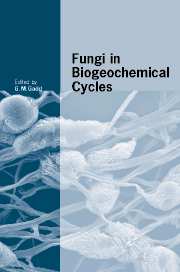Book contents
- Frontmatter
- Contents
- List of Contributors
- Preface
- 1 Geomicrobiology: relative roles of bacteria and fungi as geomicrobial agents
- 2 Integrated nutrient cycles in boreal forest ecosystems – the role of mycorrhizal fungi
- 3 Fungal roles in transport processes in soils
- 4 Water dynamics of mycorrhizas in arid soils
- 5 Integrating ectomycorrhizal fungi into quantitative frameworks of forest carbon and nitrogen cycling
- 6 Role of arbuscular mycorrhizal fungi in carbon and nutrient cycling in grassland
- 7 The role of wood decay fungi in the carbon and nitrogen dynamics of the forest floor
- 8 Relative roles of bacteria and fungi in polycyclic aromatic hydrocarbon biodegradation and bioremediation of contaminated soils
- 9 Biodegradation and biodeterioration of man-made polymeric materials
- 10 Fungal dissolution and transformation of minerals: significance for nutrient and metal mobility
- 11 Fungal activities in subaerial rock-inhabiting microbial communities
- 12 The oxalate–carbonate pathway in soil carbon storage: the role of fungi and oxalotrophic bacteria
- 13 Mineral tunnelling by fungi
- 14 Mineral dissolution by ectomycorrhizal fungi
- 15 Lichen biogeochemistry
- 16 Fungi in subterranean environments
- 17 The role of fungi in carbon and nitrogen cycles in freshwater ecosystems
- 18 Biogeochemical roles of fungi in marine and estuarine habitats
- Index
Preface
Published online by Cambridge University Press: 10 December 2009
- Frontmatter
- Contents
- List of Contributors
- Preface
- 1 Geomicrobiology: relative roles of bacteria and fungi as geomicrobial agents
- 2 Integrated nutrient cycles in boreal forest ecosystems – the role of mycorrhizal fungi
- 3 Fungal roles in transport processes in soils
- 4 Water dynamics of mycorrhizas in arid soils
- 5 Integrating ectomycorrhizal fungi into quantitative frameworks of forest carbon and nitrogen cycling
- 6 Role of arbuscular mycorrhizal fungi in carbon and nutrient cycling in grassland
- 7 The role of wood decay fungi in the carbon and nitrogen dynamics of the forest floor
- 8 Relative roles of bacteria and fungi in polycyclic aromatic hydrocarbon biodegradation and bioremediation of contaminated soils
- 9 Biodegradation and biodeterioration of man-made polymeric materials
- 10 Fungal dissolution and transformation of minerals: significance for nutrient and metal mobility
- 11 Fungal activities in subaerial rock-inhabiting microbial communities
- 12 The oxalate–carbonate pathway in soil carbon storage: the role of fungi and oxalotrophic bacteria
- 13 Mineral tunnelling by fungi
- 14 Mineral dissolution by ectomycorrhizal fungi
- 15 Lichen biogeochemistry
- 16 Fungi in subterranean environments
- 17 The role of fungi in carbon and nitrogen cycles in freshwater ecosystems
- 18 Biogeochemical roles of fungi in marine and estuarine habitats
- Index
Summary
In praise of geomycology
Interactions between the microbially dominated biosphere and the geosphere have and are profoundly affecting our planet and all life on it. Geomicrobiology can be defined as the study of the role that microbes have played and are playing in processes of fundamental importance to geology, and within the diffuse boundaries enclosed by this definition, fungi are important components. Some of the major geological processes affected by microbial activities include mineral formation, mineral degradation (including weathering, bioleaching, soil and sediment formation), element cycling and fossil fuel genesis and degradation. The cycling of component elements from organic and inorganic substrates as a result of these processes can be termed biogeochemical cycling, which again emphasizes the interplay between physicochemical and biological mechanisms. The study of the roles and importance of fungi as agents of geological change can be termed geomycology and fungi are ideally suited for this purpose. The branching, filamentous mode of growth allows efficient colonization and exploration of solid substrates while extracellular release of enzymes and other metabolites mediates many organic and inorganic transformations. Considerable physical force can arise from hyphal penetration while translocation of resources through the mycelium enables exploitation of environments where nutrients have an irregular distribution. Fungi can attack silicates, carbonates, phosphates and other minerals while their carbonaceous predilections are well-known, extending to recalcitrant organic molecules of natural origin, e.g. lignin and chitin, or from anthropogenic activity, e.g. pesticides and other xenobiotics.
- Type
- Chapter
- Information
- Fungi in Biogeochemical Cycles , pp. xvii - xxPublisher: Cambridge University PressPrint publication year: 2006

